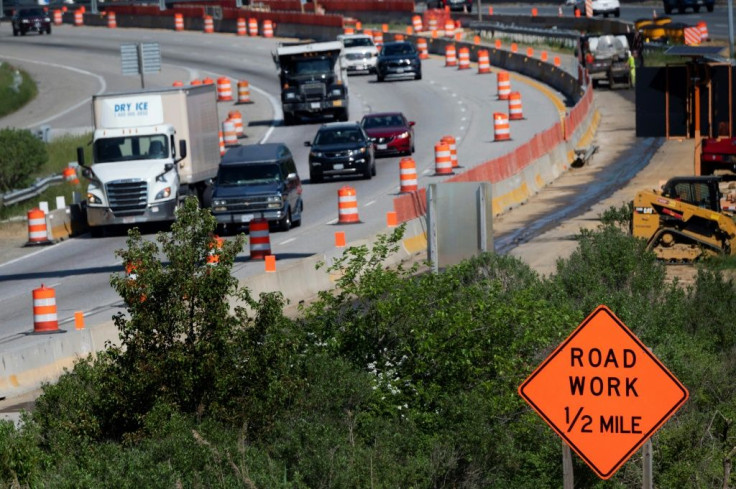Infrastructure Deal 2021: Senators Agree With White House On $1.25 Trillion Bipartisan 'Framework'
KEY POINTS
- Deal includes $579 billion in new spending, less than the $1 trillion the president had initially demanded: Report
- "There is a framework on a bipartisan infrastructure package:" Sen. Susan Collins, R-Maine
- Raising gas tax not part of the plan: Sen. Joe Manchin, D-W.Va.
- Senators to brief President Biden on Thursday
A bipartisan group of senators said Wednesday they have reached the "framework" of a deal with White House officials on a sweeping $1.25 trillion infrastructure plan, and they will brief President Joe Biden on it Thursday.
Infrastructure is one of the key legislative priorities of President Biden, who has promised to create millions of jobs as the economy struggles to claw itself out of the crater caused by the coronavirus pandemic. A deal on infrastructure is seen as a key test of whether bipartisan consensus can still be forged on key issues facing the nation in a highly partisan political environment. A breakthrough on the talks had seemed impossible even a few days ago.
There are still details to be ironed out but several lawmakers indicated an agreement is at hand.
Sen. Joe Manchin, D-W.Va., one of the negotiators, said the "framework" for the deal is the same size as the $1.25 trillion package suggested by a bipartisan group of centrist senators who have been trying to reach a deal with Biden on his American Jobs Plan.
"They said it sounded good ... We said we're all on the same page," Manchin said after the Wednesday evening meeting.
Sen. Mitt Romney, R-Utah, added: “Republicans and Democrats have come together, along with the White House, and we’ve agreed on a framework and we’re gonna be heading to the White House tomorrow."
"There is a framework on a bipartisan infrastructure package," Sen. Susan Collins, R-Maine, another member of the group, said, adding she was “optimistic we’ve had a breakthrough.”
Biden's $2 trillion American jobs plan seeks to overhaul and upgrade 20,000 miles of roads and 10,000 bridges, address climate change and racial inequities and raise corporate taxes. Its provisions would improve wages, internet service, drinking water and commute times. It has faced opposition from GOP lawmakers, and questions on how to pay for the package have met with resistance from some centrist Democrats, making its path to becoming law uncertain considering the razor-thin majority that Democrats hold in Congress.
Wednesday’s deal is a compromise on Biden’s grand plan. The deal includes $579 billion in new spending, less than the $1 trillion the president had initially demanded, reports said.

While most of the details on how to pay for the package have yet to be released, Manchin said increasing the gas tax was not part of the plan. White House officials had made it clear Biden won't accept that as raising gas taxes, by indexing to inflation, would break his pledge to not raise taxes on Americans earning less than $400,000.
Biden had called off negotiations with a group of Senate Republicans earlier this month, indicating how far apart both the sides were on the issue.
Despite the agreement in principle, Democrats are proceeding on a separate measure that includes elements from Biden's agenda — like “human infrastructure” such as free community college tuition, universal preschool and child care.
Senate Majority Leader Charles Schumer, D-N.Y., wants to have votes on both a bipartisan package and a budget resolution that would set up a second, separate Democratic-only bill in July, the Hill reported. That had put senators under intense pressure to lock in a deal before the Senate leaves town for a two-week recess Thursday.
"White House senior staff had two productive meetings today with the bipartisan group of Senators who have been negotiating about infrastructure,” White House spokesperson Jen Psaki said in a statement. “The group made progress towards an outline of a potential agreement, and the President has invited the group to come to the White House tomorrow to discuss this in person.”
A breakthrough on the package will relieve pressure on Biden as the nation awaits another jobs report Friday. U.S. jobless claims for the week ended June 12 showed a surprise rise to 412,000, up the previous week’s 375,000.
“Factors related to the pandemic, such as caregiving needs, ongoing fears of the virus, and unemployment insurance payments appear to be weighing on employment growth,” Federal Reserve Chairman Jerome Powell said last week.
© Copyright IBTimes 2024. All rights reserved.





















